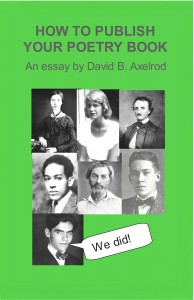The Poetry Audience
by David B. Axelrod
I’ve always been a populist poet, but that term, “populist” has probably changed meaning substantially. Using the term when it comes to literature, I use “populist” to mean someone who believes that poetry is for a large audience of people, not just for English majors and academics. More recently, however, populism has taken a sad turn politically, and even among poets it could me people who are bringing poetry down to a “least common denominator.”
When I first started writing poetry—as a thirteen-year-old boy in a macho culture—it was a secret activity. My father was an auto mechanic, a mechanical genius who could fix anything. It was as if he could talk to any machine, diagnose it, and cure it. He wasn’t very patient with his poet son, however, and to his dying day he protested “I just don’t understand poetry.”
Later, in college, I had professors who made poetry a task wherein they knew its deep, hidden meaning and we, poor students, had to guess it. To read and understand a poem, we had to study the author’s life, the historical context, every conscious and unconscious motivation of the poet. Needless to say, poetry was not for everyone. You had to be a scholar, or at least a mind reader to appreciate verse.
I wrote because I had strong feelings. As often, there were things that pained me—feelings of abuse, rejection, cruelty that I experienced or observed. It took me years to learn that I didn’t have to suffer to write a good poem. There is a stereotype of the poet starving in some garret, penning poems in poverty, depressed, and fixated on suffering. It is also true that, as a group, studies have shown that poets are prone to depression.
I, myself, attribute those tendencies to the fact that poets are keen observers. If life conspires to deaden our senses; if we aren’t inclined or even allowed to look too closely, then those who do take a closer look are likely to see some pretty bad things. Certainly, there is a genuine balance between the good and bad, the happy and sad. We need only watch the nightly news to see the pain and suffer. A sensitive person, someone who gives a voice to all that pain, could well be sad.
Those who know me more recently also know I am a secular Taoist. You might want to read my book
ANOTHER WAY: POEMS DERIVED FROM THE TAO TE CHING
https://www.ebay.com/itm/285120848632
But this is where populism often goes astray. To reach a large group of people, poets should not “write down.” They shouldn’t have to simplify, or worse, censor themselves. Their job, like a good journalist, should be to observe and channel what they see in words that will make others pay attention. Poets, in fact, are freer than reporters who are bound by the classic rules of journalism. The old style of reporting dictated that a news story should not introduce the reporter’s opinion. Poets get to personalize, personify, and set a strong tone and theme.
The task of a populist poet, therefore, is not to simplify or sanitize, but to use all his or her powers to communicate. Words are a poet’s pallet and whether it is photographic realism or abstract art, the poetry should snap the reader’s head back. Controversial subjects, graphic depictions, yes, even politically incorrect statements are fair game for poetry. There are those who say poetry should not use “those words,” or be political, or celebrate violence. To make a list of things a poet can not say is to stifle the art, to deny life.
Of course, I’m not advocating that poets set out to offend people. If they did that they would, first off, not reach a large audience. Poetry can be the antidote to cruelty, the salve for pain if not the cure. It comes from such antecedents as prayer. The poet’s real challenge is to pick the right word for the right moment. In that way a poet captures and preserves what others may not have observed.
The process of poetry can be transformative. It’s a kind of word magic–as surely as poets were not just the storytellers of the past but the shamans, priests, medicine men and women. I make no claims to such healing powers, though I have observed and participated in events where healings have occurred and poetry was the means.
What I do claim now is the right, if not the power, to put all that I see and feel into words. I won’t hold back if things aren’t pretty. I won’t restrict myself only to certain words. I want the whole pallet, redolent with colors–every variation and tone. I want high definition poetry that reflects life back at all the people so they see themselves more clearly and thus understand and love themselves that much more.


